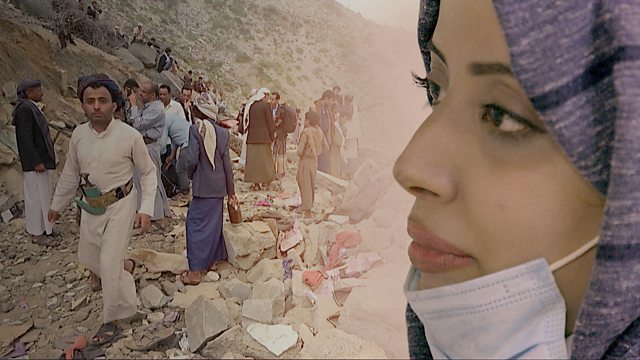
Yemen: Coronavirus in a War Zone
91热爆 Arabic鈥檚 Nawal al Maghafi investigates how both sides of the divided nation of Yemen have failed to protect their citizens from the pandemic.
As coronavirus spread across the world, nowhere seemed more vulnerable than Yemen. Now in its sixth year of war, the country is facing the world鈥檚 worst humanitarian crisis. 91热爆 Arabic鈥檚 Nawal al Maghafi is the first reporter to enter Yemen since the outbreak of Covid-19. In this film, she investigates how both sides of this divided nation have failed to protect their citizens from the pandemic.
It's an extraordinary story about one of the world鈥檚 poorest countries, laid low by years of war and now abandoned by the international community. In the north, the Houthi government appears to be in denial about the Covid-19 crisis and conspiracy theories are rife, while in the south, there鈥檚 infighting between officials, and rivalry with foreign health workers. Citing security concerns, M茅decins Sans Fronti猫res quit Aden, leaving it without a single Covid-19 ward.
Nawal investigates what happened when coronavirus hit Yemen's health system, already badly damaged by the war. She looks at how the authorities in both the north and south have tried to cover up their mismanagement.
In Sanaa, the Houthi capital in northern Yemen, Nawal finds that the authorities suppressed news of Covid cases, which resulted in an outbreak far larger than they could handle. For months they insisted there had been only four deaths in total and deprived the public of information about the real risks. Meanwhile, bodies were being buried at night and doctors were banned from saying what was going on inside hospital wards. The Houthi minister of health maintains they did not have a problem with sharing statistics but were trying to prevent panic amongst the Yemeni people and that they had fewer cases than other countries in the region.
Nawal travels south to Aden, the temporary capital of Yemen鈥檚 internationally recognised government. When coronavirus reached Aden in April, hospitals were unprepared and turned away patients who showed symptoms. They denied them treatment and, in many cases, gave them no choice but to die at home. There are no official mortality figures and the city鈥檚 unofficial record keeper is Ghassan, a gravedigger in a Covid-19 cemetery. He tells Nawal how he was overwhelmed by the number of bodies arriving for burial.
She meets Abdulkareem, who became desperate after taking his father to four hospitals and being refused treatment by each one. When they arrived at the fifth hospital, young medic in training Dr Zoha took pity and admitted them, though it was too late to save Abdulkareem's father. In this city of a million people, she was the sole doctor in the one hospital that accepted Covid-19 cases. In the whole of April, not one of her patients survived.
With unique access to both parts of the country, Nawal witnesses how a nation that depends on humanitarian assistance for survival has been forced to face a pandemic, just when countries and NGOs were cutting their aid. The British government contributes assistance to Yemen, but after Covid-19 hit, it announced a 30 per cent cut in its aid budget.
Yemen's minister of health declined to give an interview but told the 91热爆 that his government's relation with MSF was excellent, and that in a large number of governorates MSF fulfils its humanitarian mission.
